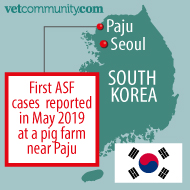
South Korea is home to more than 11 million pigs
African swine fever (ASF) has been confirmed in South Korea for the first time.
The news follows an admission from farming minister George Eustice that the disease could spread to the UK within a year.
On Tuesday, South Korea’s agriculture minister confirmed the presence of ASF at a pig farm in Paju, near the border of North Korea. He said that the farm reported its first case of the virus in May.
According to the National Pig Association (NPA), Kim Hyeon-soo told reporters some 4,000 pigs would be culled to prevent the spread of the virus, adding that the animal disease alert level would be raised to maximum.
“We will make all efforts to stop the spread of African swine fever through swift disinfection measures,” he said.
The ministry is also reported to have ordered a nationwide ban on the movement of pigs and related livestock while it looks into the source of the virus.
Since ASF was first detected in China in August 2018, it has affected Vietnam, Mongolia, Cambodia, Laos, Myanmar, Hong Kong, North Korea and the Philippines.
South Korea is home to more than 11 million pigs, and pork is the country’s most popular meat. According to the agriculture ministry data, 27kg of pork was consumed per person in 2018.



 The Federation of Independent Veterinary Practices (FIVP) has announced a third season of its podcast, Practice Matters.
The Federation of Independent Veterinary Practices (FIVP) has announced a third season of its podcast, Practice Matters.